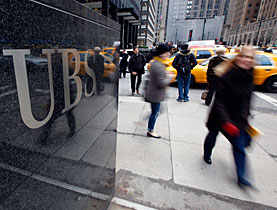Swiss banks turn backs on US clients

More Swiss banks are turning down business from potential customers in the United States fearing legal problems and a mass of red tape.
Banking giant UBS earlier this week blocked access to investment accounts held by American clients as it winds down offshore services with the US. But other banks are also shunning the lucrative market across the Atlantic.
With UBS embroiled in a bitter court case with the US tax authorities that threatens Swiss banking secrecy and its reputation as a wealth manager, rivals are adopting a safety-first attitude.
Pierre Mirabaud told a recent lunch meeting of the American International Club of Geneva that his Mirabaud private bank would rather turn away clients and their investments than sign up to stringent rules imposed by the US authorities.
Bank Raiffeisen are also taking a conservative line. “We are recommending our banks not to open any new client relations to clients living in the US. The future procedures with the US are unclear,” spokesman Stefan Kern told swissinfo.ch.
“Toxic clients”
Those proceedings are an ongoing court case lodged by the US tax authorities, the Internal Revenue Service (IRS), against UBS, demanding the release of confidential data on 52,000 clients. The case will reach a pivotal point on July 13 unless a diplomatic solution can be found.
So far, there are precious few signs that the US will accept a deal even though a revised double taxation treaty has been agreed with Switzerland.
There has also been anecdotal evidence in the Swiss media of US citizens living in Switzerland being turned away by Swiss banks. Andy Sundberg of the Geneva-based American Citizens Abroad group said the Swiss banking aversion to US customers appeared to be spreading.
“More banks are publicly announcing that they do not want American clients anymore. The banks are simply not willing to take such risks anymore and are simply eliminating American clients,” he told swissinfo.ch.
“The US administration has decided that it is justified to turn its citizens into toxic clients.”
Smear campaign
Sundberg said he did not blame UBS for shutting down current accounts of US clients last autumn, followed by investment accounts on Wednesday. But Lawrence Desmond, a dual US-Swiss citizen living in California, was annoyed by the abrupt manner in which his account was terminated last year.
UBS decided to end offshore banking with US clients last July after becoming embroiled in the IRS investigation into tax evasion. Desmond was one of thousands of customers that were given 45 days to transfer their money into a special unit registered with the US authorities or away from the bank altogether.
Desmond, who had a few thousand francs deposited in his Swiss account to spend when he visited the country, condemned his eviction as “unprofessional”. He has since been able to transfer his money into a Swiss Post Office account, an option denied to people without a Swiss passport who live abroad.
But Desmond also apportions some of the blame onto the US authorities, who he claims have created unfair pressure on the Swiss banking system.
“The US administration has done a really good job of making people think automatically that the whole Swiss banking system is a place where all the crooks go,” he told swissinfo.ch.
“The American public is totally convinced that the 52,000 [UBS] accounts are all ultra rich people hiding their money from the taxman.”
Matthew Allen, swissinfo.ch
Cross border banking between the US and other countries became more complex on January 1, 2001, when the US introduced the Qualified Intermediary (QI) program
This requires banks, including those in Switzerland, to identify US resident clients, withhold tax on their US based investments and send the money to the Internal Revenue Service – the US tax collection agency – if the client fails to report their holding to the IRS.
Failure to comply with QI could see foreign banks thrown out of the American banking system. The program does not require Swiss banks to reveal details of their clients to the US authorities.
US citizens depositing money overseas are also required by law to fill out a Report of Foreign Bank and Financial Accounts (FBAR) form declaring their funds.
US nationals who have not complied with the regulations in the past have been urged by the IRS to declare their misdemeanors before they are tracked down to face a stiffer penalty.

In compliance with the JTI standards
More: SWI swissinfo.ch certified by the Journalism Trust Initiative












You can find an overview of ongoing debates with our journalists here . Please join us!
If you want to start a conversation about a topic raised in this article or want to report factual errors, email us at english@swissinfo.ch.